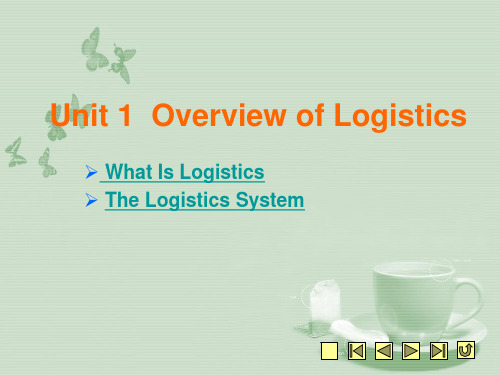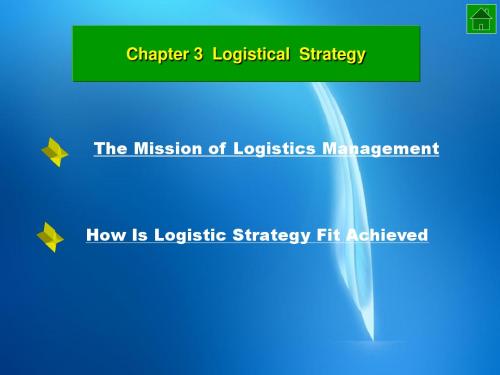《现代物流专业英语》 Modern Logistics
- 格式:ppt
- 大小:730.50 KB
- 文档页数:2





物流专业英语作文范文英文回答:Logistics: The Backbone of Modern Supply Chains.Logistics, the intricate and multifaceted discipline, plays a paramount role in ensuring the seamless flow of goods and services from their point of origin to theirfinal destination. It involves a complex web of interconnected processes that orchestrate the efficient and cost-effective movement and storage of materials, products, and information. In an increasingly globalized marketplace, logistics has become the cornerstone of supply chain management, enabling businesses to optimize their operations, reduce costs, and enhance customer satisfaction.The scope of logistics encompasses a wide array of activities, including transportation, warehousing,inventory management, and supply chain design. Transportation, the backbone of any logistics system,involves the movement of goods via multiple modes, such as road, rail, sea, and air. Warehousing provides temporary storage facilities for goods awaiting further distribution or sale. Inventory management ensures the optimal level of stock to meet demand while minimizing inventory costs. Supply chain design involves the strategic planning and coordination of all logistics activities to ensure seamless integration and efficiency.The rapid advancements in technology have had a profound impact on the logistics industry. The advent of advanced tracking systems, such as GPS and RFID, has enabled real-time visibility of shipments, enhancing transparency and accountability. E-commerce platforms have revolutionized the way businesses reach customers, creating a surge in demand for parcel delivery services. The adoption of automation and robotics in warehousing has improved efficiency, reduced costs, and increased safety.To navigate the complexities of modern logistics, businesses require a highly skilled workforce with a comprehensive understanding of the industry. Logisticsprofessionals are responsible for planning, executing, and managing supply chain operations, leveraging their knowledge of transportation, warehousing, and inventory management. They collaborate with suppliers, customers, and transportation providers to ensure smooth and timely delivery of goods.In today's competitive business environment, logistics is not merely a cost center but a strategic competitive advantage. By optimizing their logistics operations, businesses can reduce lead times, minimize inventory costs, enhance customer service, and gain a competitive edge. Effective logistics management enables businesses to respond quickly to market demands, adapt to supply chain disruptions, and ultimately deliver superior value to their customers.中文回答:物流,现代供应链的支柱。

物流专业英语课后答案Chapter1Ⅰ.1、物流管理2、谈及,提及,说到3、以最大成本效益的方式4、物理协会5、信息管理6、另外,除此之外7、物流装置8、也,同样Ⅱ.1、the transfer of goods;the most cost-effective2、hardware;information control3、materials;information4、it is about the flow and storage of goods5、goods, service, the point of consumption6、logistics strategies and activitiesⅢ.1、提到物流或物流管理,说法并不统一,不同的组织对此有不同的定义。
2、文明社会伊始,物流就已经存在,因而不是新鲜事。
3、然而说到现代物流,几乎所有商业界专业人士认为,尽管看不见,摸不着,物流却是最有挑战性和刺激性的工作之一。
4、现代物流关系到货物流和信息流的有效性和高效性。
Ⅳ.1.D2.C3.A4.B5.DⅤ.1.quick response2.a new commercial arearmation technology4.containerization technique5.modern logistics6.major function7.location value8.distribution processing valueⅥ.现代物流采用了集装技术。
商品物流往往从包装开始,而后经历运输、储存和配送等过程。
整个过程始终在物流标准化的前提下运行。
以物流基础模数尺寸600毫米×400毫米为基础,制定出物流模数尺寸1200毫米×1000毫米,并将其放大至2591毫米×2483毫米,即形成集装箱高度乘宽度的标准尺寸,并能调整成适合铁运、汽运和船运的集装箱标准规格尺寸。
物流专业英语词汇大全-物流英语-物流专业英语-物流英语词汇表?一、物流英语的145个专业词汇?(1)物流英语之基本概念术语?1.物品?article?2.物流?logistics?3.物流活动?logistics?activity?4.物流作业?logistics?operation?5.物流模数?logistics?modulus?6.物流技术?logistics?technology?7.物流成本?logistics?cost?8.物流管理?logistics?management?9.物流中心?logistics?center?10.物流网络?logistics?network?11.物流信息?logistics?information?12.物流企业?logistics?enterprise?13.物流单证?logistics?documents?14.物流联盟?logistics?alliance?15.供应物流?supply?logistics?16.生产物流?production?logistics?17.销售物流?distribution?logistics?18.回收物流?returned?logistics?19.废弃物物流?waste?material?logistics?20.绿色物流?environmental?logistics?21.企业物流?internal?logistics?22.社会物流?external?logistics?23.军事物流?military?logistics?24.国际物流?international?logistics?25.第三方物流?third-part?logistics?(TPL)?26.定制物流?customized?logistics?27.虚拟物流?virtual?logistics?28.增值物流服务?value-added?logistics?service?29.供应链?supply?chain?30.条码?bar?code?31.电子数据交换?electronic?data?interchange?(EDI)?32.有形消耗?tangible?loss?33.无形消耗?intangible?loss?物流专业英语词汇大全-物流英语-物流专业英语-物流英语词汇表?一、物流英语的145个专业词汇?(1)物流英语之基本概念术语?1.物品?article?2.物流?logistics?3.物流活动?logistics?activity?4.物流作业?logistics?operation?5.物流模数?logistics?modulus?6.物流技术?logistics?technology?7.物流成本?logistics?cost?8.物流管理?logistics?management?9.物流中心?logistics?center?10.物流网络?logistics?network?11.物流信息?logistics?information?12.物流企业?logistics?enterprise?13.物流单证?logistics?documents?14.物流联盟?logistics?alliance?15.供应物流?supply?logistics?16.生产物流?production?logistics?17.销售物流?distribution?logistics?18.回收物流?returned?logistics?19.废弃物物流?waste?material?logistics?20.绿色物流?environmental?logistics?21.企业物流?internal?logistics?22.社会物流?external?logistics?23.军事物流?military?logistics?24.国际物流?international?logistics?25.第三方物流?third-part?logistics?(TPL)?26.定制物流?customized?logistics?27.虚拟物流?virtual?logistics?28.增值物流服务?value-added?logistics?service?29.供应链?supply?chain?30.条码?bar?code?31.电子数据交换?electronic?data?interchange?(EDI)?32.有形消耗?tangible?loss?33.无形消耗?intangible?loss?奖罚???(2)物流英语之物流作业术语?1.运输?transportation?2.联合运输?combined?transport?3.直达运输?through?transport?4.中转运输?transfer?transport?5.甩挂运输?drop?and?pull?transport?6.集装运输?containerized?transport?7.集装箱运输?container?8.门到门?door-to-door? 9.整箱货?full?container?load?(FCL)?transport?10.拼箱货?less?than?container?load?(LCL?)?11.储存?storing?12.保管?storage?13.物品储存?article?reserves?14.库存?inventory?15.经常库存?cycle?stock?16.安全库存?safety?stick?17.库存周期?inventory?cycle?time? 18.前置期(或提前期)?lead?time?19.订货处理周期?order?cycle?time?20.货垛?goods?stack?21.堆码?stacking?22.搬运?handing/carrying?23.装卸?loading?and?unloading?24.单元装卸?unit?loading?and?unloading?25.包装?package/packaging?26.销售包装?sales?package?27.定牌包装?packing?of?nominated?brand?28.中性包装?neutral?packing?29.运输包装?transport?package?30.托盘包装?palletizing? 31.集装化?containerization?32.散装化?containerization?33.直接换装?cross?docking?34.配送?distribution?35.共同配送?joint?distribution?36.配送中心?distribution?center? 37.分拣?sorting?38.拣选?order?picking?39.集货?goods?collection?40.组配?assembly? 41.流通加工?distribution?processing?42.冷链?cold?chain?43.检验?inspectiontransport?10.拼箱货?less?than?container?load?(LCL?)?11.储存?storing?12.保管?storage?13.物品储存?article?reserves?14.库存?inventory?15.经常库存?cycle?stock?16.安全库存?safety?stick?17.库存周期?inventory?cycle?time? 18.前置期(或提前期)?lead?time?19.订货处理周期?order?cycle?time?20.货垛?goods?stack?21.堆码?stacking?22.搬运?handing/carrying?23.装卸?loading?and?unloading?24.单元装卸?unit?loading?and?unloading?25.包装?package/packaging?26.销售包装?sales?package?27.定牌包装?packing?of?nominated?brand?28.中性包装?neutral?packing?29.运输包装?transport?package?30.托盘包装?palletizing?31.集装化?containerization?32.散装化?containerization?33.直接换装?cross?docking?34.配送?distribution?35.共同配送?joint?distribution?36.配送中心?distribution?center?37.分拣?sorting?38.拣选?order?picking?39.集货?goods?collection?40.组配?assembly?41.流通加工?distribution?processing?42.冷链?cold?chain?43.检验?inspection?奖罚?(3)物流英语之物流技术装备及设施术语物流?1.仓库?warehouse?2.库房?storehouse?3.自动化仓库?automatic?warehouse?4.立体仓库?stereoscopic?warehouse?5.虚拟仓库?virtual?warehouse?6.保税仓库?boned?warehouse?7.出口监管仓库?export?supervised?warehouse?8.海关监管货物?cargo?under?customer’s?supervision?9.冷藏区?chill?space?10.冷冻区?freeze?space?11.控湿储存区?humidity?controlled?space?12.温度可控区?temperature?controlled?space?13.收货区?receiving?space?14.发货区?shipping?space?15.料棚?goods?shed?16.货场?goods?yard?17.货架?goods?shelf?18.托盘?pallet?19.叉车?fork?lift?truck?20.输送机?conveyor?21.自动导引车?automatic?guided?vehicle?(AGV)?22.箱式车?box?car?23.集装箱?container?24.换算箱?twenty-feet?equivalent?unit?(TEU)?25.特种货物集装箱?specific?cargo?container?26.全集装箱船?full?container?ship?27.铁路集装箱场?railway?container?yard?28.公路集装箱中转站?inland?container?depot?29.集装箱货运站?container?freight?station?(CFS)?30.集装箱码头?container?terminal?31.国际铁路联运?international?through?railway?transport?32.国际多式联运?international?multimodal?transport?33.大陆桥运输?land?bridge?transport? 34.班轮运输?liner?transport?35.租船运输?shipping?by?chartering?36.船务代理?shipping?agency?37.国际货运代理?international?freight?forwarding?agent?38.理货?tally?39.国际货物运输保险?international?transportation?cargo?insurance?40.报关?customs?declaration?41.报关行?customs?broker?42.进出口商品检验?commodity?inspection?(4)物流英语之物流管理术语?1.物流战略?logistics?strategy?2.物流战略管理?logistics?strategy?management?3.仓库管理?warehouse?management?4.仓库布局?warehouse?layout?5.库存控制?inventory?control?6.经济订货批量?economic?order?quantity?(EOQ)?7.定量订货方式?fixed-quantity?system?(FQS)?8.定期订货方式?fixed-quantity?system?(FIS)?9.ABC分类管理?ABC?classification?10.电子订货系统?Electronic?order?system?(EOS)?11.准时制?just?in?time?(JIT)?12.准时制物流?just-in-time?logistics?13.零库存技术?zero-inventory?logistics?14.物流成本管理?logistics?cost?control?15.物料需要计划?material?requirements?planning?(MRP)?16.制造资源计划?manufacturing?resource?planning?(MRP?II)?17.配送需要计划?distribution?requirements?planning?(DRP)?18.配送资源计划?distribution?resource?planning?(DRP?II)?19.物流资源计划?logistics?resource?planning?20.企业资源计划?enterprise?resource?planning?(ERP)?21.供应链管理?supply?chain?management?(SCM)?22.快速反映?Quick?response?(QR)?23.有效客户反映?efficient?customer?response(ECR)?24.连续库存补充计划?continuous?replenishment?program?(CRP)?25.计算机付诸订货系统?computer?assisted?ordering?(CAO)?26.供应商管理库存?vendor?managed?inventory?(VMI)?27.业务外包?outsourcing二、常用物流英语50句?1.Modern?logistics?is?one?of?the?most?challenging?and?exciting?jobs?in?the?world.???现代物流是世界上最富挑战性和最激动人心的工作。
第一章TEXT A LogisticsLogistics is a unique global pipeline that operates 24 hours a day, seven days a week and 52 weeks a year, planning and coordinating the transport and delivery of products and service to customers all over the world.Coming into being with the advent of civilization, logistics is anything but a newborn baby. However, when it comes to modern logistics, most professionals in the business consider it one of the most challenging and exciting jobs, invisible as it is.Modern logistics is related to the effective and efficient flow of materials and information that are of vital importance to customers and clients in various sections of the economic society, which may include but by no means is limited to: packaging, warehousing, material handling, inventory, transport, forecasting, strategic planning, and customer service.“logistics is that part of the supply chain process that plans, implements and controls the efficient, effective flow and sto rage of goods, service and related information from the point of origin to the point of consumption to meet customers’ requirements”although this definition fails to incorporate all specific terms used in the study of logistics, it does reflect the need for total movement management from point of material procurement to location of finished product distribution..TEXT B Competitive AdvantageThere are various ways in which products compete in the marketplace. Perhaps a given product is something that no one else can match in terms of price. Or maybe you offer a produce that is technically superior, such as the Gillette razor blade. While new produce development has logistics implication, the key advantage provided by logistics-is product availability in the market place at low cost. Logistics supports competitiveness and availability as a whole by meeting the end-customers demands in supplying what is needed in the form it is needed, when it is needed, at a competitive cost. There is a forth variable, which controls the logistics process: the dependability advantage.The quality advantageThe most fundamental objective is to carry out all processes across the supply chain so that the end product does what it is supposed to do, Quality is the most visible aspect of supply chain performance .defects and late deliveries are symptoms of quality problems in supply chain processes. Such problems negatively influence customer’s loyaltyInternally, controlling measures, at the heart of supply structure, will help to reduce costs by eliminating errors, and help to increase dependability by making processes more certain.The time advantageTime measures how long a customer has to wait in order to receive a given product or service. Time can be a big factor in getting orders of companies who have learned that some customers do not want to wait—and are prepared to pay a premium to get what they want quickly. The time advantage is variously described as speed of responsiveness in practice.Speeding up the supply chain processes may help to improve freshness of the end product, or to reduce the risk of obsolete or over-aged stock in the system.The cost advantageMany products compete specifically on the basis of low price。